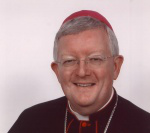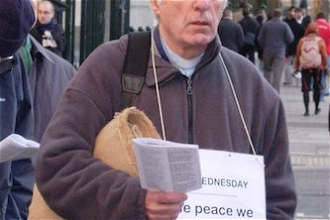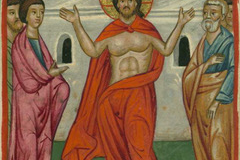Archbishop urges more recognition of carers

Speaking at a Charity Leaders' Network lunch (ACEVO) in Birmingham last week, the Catholic Archbishop of Birmingham, the Most Reverend Bernard Longley said that the "tough commissioning regime" for national and local government service contracts means that the wages of "many carers are depressed".
He said that his own diocesan agency, the Father Hudson Society, is currently "grappling with the issue of how to move carers in residential care for frail elderly and those with dementia up to the Living Wage". It is also looking at how best to make quality care "affordable to those of low income and with no capital".
The Archbishop highlighted how the "recent scandals in care homes" have shone a light on the need for "good, motivated, properly trained and properly supervised staff to provide real care for very vulnerable old people".
He revealed how a social action Covenant is currently being considered by the Birmingham Faith Leaders Group. He said that "the Covenant would be a joint commitment between our faith communities and the local authority to a set of principles that would guide our engagement together, aiming to remove some of the mistrust that can exist and promoting open, practical working on all levels". The Birmingham Faith Leaders Group was founded after the 9/11 terrorist attack and brings together leaders of the Christian, Muslim, Jewish, Buddhist, Hindu and Sikh communities of the city.
Drawing attention to some of the award winning social action work being carried out by projects linked to the Catholic Church in Birmingham, the Archbishop said that recent research shows that there are over 600 individual Catholic projects in the Birmingham Archdiocese "working to relieve poverty in its broadest sense and building better and stronger communities". These projects are run by 3000 volunteers and over 300 paid staff and often this work is carried out in collaboration with other Christian denominations, faith communities and/or voluntary agencies.
The Church supports "the Big Society plan of the Conservative Party to encourage communities to come together to address their problems locally," the Archbishop said. Adding that "even before the Big Society, (the Church) has been encouraging this collaborative approach".
The full address follows.
The Role of Social Leaders in Challenging Poverty and building Stronger Communities
Ladies and Gentlemen, members of ACEVO: I'm delighted to have been asked to join you today and I want to welcome you to Birmingham. My particular thanks to Sir Stephen Bubb for inviting me to this event. We have known each other for a very long time - since our university days together in Oxford in the mid-1970's, when we would occasionally debate together at the Oxford Union Society.
Those of us who live and work here in Birmingham have no hesitation in describing it as a great city - but a city many of whose citizens are often unduly modest about its achievements, its environment and the opportunities that it has to offer.
It is also, as you will know, a multi-cultural city and one that is blessed with the lively presence of many different faith communities. These are naturally focussed on the worship of God and the practice of religion and at the heart of that religious practice is a profound concern that arises from their foundation in faith to find effective and collaborative ways of reaching out to the society in which we are at home and of serving those who are most needy and facing the great challenges in the contemporary world.
The leaders of the main faith communities meet regularly together and have done ever since the Birmingham Faith Leaders Group was founded soon after the event of 9/11. Last week I chaired our last meeting at the Central Mosque alongside Bishop David Urquhart, the Bishop of Birmingham, and the leaders of the Muslim, Jewish, Buddhist, Hindu and Sikh communities of the city. In solidarity with our Muslim neighbours at a particularly difficult time, when the various Trojan Horse reports are being published, we stayed late into the evening to be with the local Muslim community at their Iftar, the breaking of the daily fast during Ramadan.
Our group is currently considering the possibility of making a Covenant with Birmingham City Council and we have been encouraged in this by the All Party Parliamentary Group on Faith and Society. The Covenant would be a joint commitment between our faith communities and the local authority to a set of principles that would guide our engagement together, aiming to remove some of the mistrust that can exist and promoting open, practical working on all levels.
In the Covenant the local authority will be asked to commit itself to welcome the involvement of faith communities in the delivery of services and social action on an equal basis with other groups. The faith-based organisations in their turn will be asked to commit themselves to work actively with the local authority in the design and delivery of services to the public. We still have some way to go before this is launched but we hope to agree the Covenant this autumn.
In this context I wish to refer to the New Testament Christian Scriptures for some inspiring words to carry my theme forward. I want to put before you the advice of Jesus in St Mathew's Gospel to his disciples. Do not store up treasures for yourselves on earth where moths and woodworm destroy them and thieves can break in and steal them. But store up treasures for yourself in Heaven. (Matt.6.19)
Speaking from within the Catholic Church, we do challenge the government over ensuring that those not able through disability or unemployment to earn a living have benefits to cover life's basic necessities - that was the whole basis of the welfare state of which our country should rightly be proud.
On behalf of the Roman Catholic Church much of this challenging is carried out publicly by Cardinal Vincent Nichols, my predecessor as Archbishop of Birmingham. As the President of the Bishops' Conference of England and Wales his office has a high profile, and he is supported in this role by CSAN or Caritas Social Action Network, the umbrella body of the network of Catholic Agencies, many of which are involved in direct delivery of Social Care. These Agencies meet regularly and feed their experiences on the ground into the lobbying and challenging carried out by the Church.
And there is much to challenge in both national and local government policy, not only at the level of benefits and the criteria governing them, but also in the price paid for contracted services to the private and voluntary sector organisations. The present tough commissioning regime means that the wages of many carers are depressed, often to the minimum wage with few benefits beyond those statutorily required. (This matter was raised by Archbishop Sentamu in his report on the Living Wage on 24th June). The Bishop's Conference endorses the Living Wage and has requested that all Catholic Agencies seek to create a plan to having the Living Wage as the minimum wage in their organisation.
In our own diocesan agency, Father Hudson's Society, they are grappling with the issue of how to move carers in residential care for frail elderly and those with dementia up to the Living Wage, and at the same time how to make the quality care offered in a modern, purpose-designed building affordable to those of low income and with no capital. It is an intractable problem but, as recent scandals in care homes have shown , there has to be an adequate number of good, motivated, properly trained and properly supervised staff to provide real care for very vulnerable old people.
Poverty goes far beyond lack of material wealth. We can speak of poverty as a deficiency of necessary or desirable ingredients. The necessary and desirable ingredients of life go beyond material possessions, although of course the basic material necessities - food, a roof over one's head, clothes etc. are being met by many faith-based organisations - foodbanks, night shelters, through the distribution of clothing parcels. But what of the other necessities and desirable ingredients of life: being loved and cared about, a sense of belonging and of community? Poverty includes isolation, loneliness, fear in one's environment, being deprived of opportunities and lacking a voice.
Faith Communities have long worked for the relief of poverty and while we recognise that the State has assumed many of the roles previously undertaken by faith-based charities, there is also recognition both within the Faith Communities and within Government that the State can only do so much. Some would maintain that it is not healthy for the State to try to do too much. Hence the Big Society plan of the Conservative Party to encourage communities to come together to address their problems locally.
The Church supports that concept and has, even before the Big Society, been encouraging this collaborative approach. At this point, by way of illustration, I would like to offer some examples from within my own Archdiocese, knowing that these can be matched by many other examples within the different faith communities of this city:
New Heights Community Project is based around the Catholic Church of Christ the King in Kingstanding. This was set up by the then Parish Priest, Fr Michael White (now engaged in establishing the Heart of Tamworth project in Staffordshire) and a committed group of volunteers to provide activities, advice and education for people from the local community of all ages. It has grown and grown, out-growing its original premises, expanding into new extensions and it is now a key part of the community in Kingstanding. Along the way it has won:
Best Community Engagement of the Decade in the West Midlands from RegenWM in 2010
Everyday Impact Award for Long-term Enterprises awarded by DSC
Natwest CommunityForce award
Prime Minister's Big Society Award
The Queen's Award for Voluntary Service
In Wolverhampton, the Hope Family Project has been based on the Heath Town Estate, searching out those behind locked doors, too afraid to come out, for over 25 years. Originally known as Hope Community it has been the one constant on that estate, where everything else has come and gone - school, crèche, community centre, shops, estate management board. Now it too is under threat as its premises are due for demolition, but it has been offered a couple of flats to work from, which would take it back to its origins, when a group of Religious Sisters started the work from a deck-access flat on the estate.
In Maryvale, near Kingstanding, a parish-based charity provides regular social gatherings, lunches and trips for older people from the wider community and for adults with disabilities. In many parishes there are less formal arrangements to provide social gatherings for the older members of the church community and for those who are housebound.
In Smethwick, Brushstrokes project has earned a well-founded reputation for its work with refugees and asylum seekers arriving in this country with nothing. It has helped them to learn the language, find housing, offered advice services and most importantly offered the hand of friendship.
And here in Birmingham, St Chad's Sanctuary, a collaboration between St Chad's Cathedral and the Salvation Army, is extending the hand of friendship to refugees in the city centre, offering help with material needs, with clothing and food as well as training opportunities.
Along with our professional social care agency, Father Hudson's Society, who have a degree of involvement in all these projects, we have been researching into Catholic Church-based social care across our Archdiocese. Often the work is in collaboration with other Christian denominations and sometimes other faith communities or voluntary agencies and we have so far identified over 600 individual projects working to relieve poverty in its broadest sense and building better and stronger communities, with over 3000 volunteers and over 300 paid staff.
Since these statistics come from just within one denominational community I leave you to imagine and quantify the broader picture which has yet to be fully assessed and presented.
+Bernard Longley
Archbishop of Birmingham


















